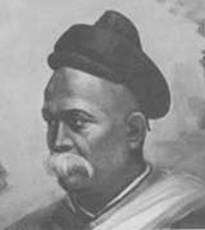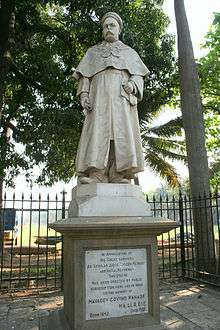Mahadev Govind Ranade
| Mahadev Govind Ranade | |
|---|---|
 | |
| Born |
18 January 1842 Niphad, Nashik District, Maharashtra, India |
| Died | 16 January 1901 |
| Occupation | Social reformer, author |
| Political party | Indian National Congress |
| Spouse(s) | Ramabai Ranade |
Mahadev Govind Ranade (18 January 1842 – 16 January 1901) was a distinguished Indian scholar, social reformer and author. He was a founding member of the Indian National Congress (INC) [1] and owned several designations as member of the Bombay legislative council, member of the finance committee at the centre, and the judge of Bombay High Court.[2]
As well known public figure, his personality as a calm and patient optimist would influence his attitude towards dealings with Britain as well as reform in India. During his life he helped to establish the Vaktruttvottejak Sabha, the Poona Sarvajanik Sabha and the Prarthana Samaj, and would edit a Bombay Anglo-Marathi daily paper, the Induprakash, founded on his ideology of social and religious reform.
Biography
Mahadev Govind Ranade was born in Niphad, a taluka town in Nashik district in a Chitpavan Brahmin family.[3] Upon the death of his first wife, his reform-minded friends expected him to marry (and thereby rescue) a widow. However, he adhered to his family's wishes and married a child bride from the Kurlekar family, whom he subsequently provided with an education.[4] After his death, she (Mrs. Ramabai Ranade) continued his social and educational reform work.He had no children.

Social
Ranade was a founder of the Social Conference movement, which he supported till his death, directing his social reform efforts against child marriage, the shaving of widows' heads, the heavy cost of marriages and other social functions, and the caste restrictions on traveling abroad, and he strenuously advocated widow remarriage and female education. He was one of the founders of the Widow Marriage Association in 1861.[5] Though Ranade criticised superstitions and blind faith, he was conservative in his own life. He chose to take prayaschitta (religious penance) in case of Panch-houd Mission Case rather than taking a strong side of his opinions.[6][7]
Justice Ranade, Vaman Abaji Modak, and historian Dr. R. G. Bhandarkar established the Maharashtra Girls Education Society and Huzurpaga, the oldest girls' high school in Pune as well as in Maharashtra, India in 1885.,[8][9][10]
Works
- Ranade, Mahadev Govind, Rise of the Maratha Power (1900); reprint (1999) ISBN 81-7117-181-8
- Bipan Chandra, ed., Ranade’s Economic Writings New Delhi, Gyan Books Pvt. Ltd. (1990) ISBN 81-212-0328-7.
In popular culture
A television series on Zee Marathi named Uncha maaza zoka (roughly translated as 'I have leapt high in Life') based on Ramabai's and Mahadevrao's life and their development as a 'women's rights' activist was telecasted in March 2012,.[6] This series was critically acclaimed and celebrated throughout Maharashtra. The TV series was based on a book by Ramabai Ranade titled "Amachyaa Aayushyaatil Kaahi Aathavani" (in Marathi). In the book, Justice Ranade is called "Madhav" rather than Mahadeo[note 1].
See also
Footnotes
References
- ↑ "Mahadev Govind Ranade". Retrieved 2015-08-22.
- ↑ "Encyclopaedia Eminent Thinkers (Vol. 22 : The Political Thought of Mahadev Govind Ranade)", p. 19
- ↑ Wolpert, Stanley A. (April 1991). Tilak and Gokhale: Revolution and Reform in the Making of Modern India By. Oxford: Oxford University Press. p. 302. ISBN 978-0195623925.
- ↑ Mukherjee, M., 1993. Story, history and her story. Studies in History, 9(1), pp.71-85.
- ↑ "THE GROWTH OF NEW INDIA, 1858-1905". Astrojyoti.com. 2012-05-17. Retrieved 2012-07-07.
- ↑ Bakshi, SR (1993). Mahadev Govind Ranade. p. 42. ISBN 978-81-7041-605-0.
- ↑ "Loss of Caste". Retrieved 2015-08-22.Ranade and a few other notables like Bal Gangadhar Tilak attended a meeting with the missionaries of the Panch Houd Mission that still exists in Pune. Apparently, tea was offered to them. Some of them drank it and some others did not. Gopalrao Joshi made this affair public. Poona in those days - late 19th century - was a very orthodox place and the bastion of Brahminism. All offenders were ordered to undergo Prayashchitta for their offense of drinking tea of Christian missionaries.
- ↑ Bhattacharya, edited by Sabyasachi (2002). Education and the disprivileged : nineteenth and twentieth century India. (1. publ. ed.). Hyderabad: Orient Longman. p. 239. ISBN 978-8125021926. Retrieved 12 September 2016.
- ↑ "Huzurpaga". Huzurpaga.
- ↑ Ghurye, G. S. (1954). Social Change in Maharashtra, II. Sociological Bulletin, page 51.
- ↑ Dave, Vibhuti (6 December 2014). Amaaraa Sahajivan naa Sambhaaranaa. Vadodara, Gujarat, India: Self. pp. 12, 121.
- Brown, D. Mackenzie. "Indian Political Thought: From Ranade to Bhave." (Berkeley: University of California Press: 1961).
- Mansingh, Surjit. Historical Dictionary of India., vol. 20, Asian Historical Dictionaries. s.v. "Shivaji." London: Scarecrow Press, 1996.
- Masselos, Jim. Indian Nationalism: A History. (New Delhi: Sterling Publishers, 1985).
- Wolpert, Stanley. India. (Berkeley: University of California, 1991). 57.
- Wolpert, Stanley. Tilak and Gokhale: Revolutions and Reform in the Making of Modern India. (Berkeley: University of California, 1962). 12.
![]() This article incorporates text from a publication now in the public domain: Chisholm, Hugh, ed. (1911). "article name needed". Encyclopædia Britannica (11th ed.). Cambridge University Press.
This article incorporates text from a publication now in the public domain: Chisholm, Hugh, ed. (1911). "article name needed". Encyclopædia Britannica (11th ed.). Cambridge University Press.
| Wikimedia Commons has media related to Mahadev Govind Ranade. |